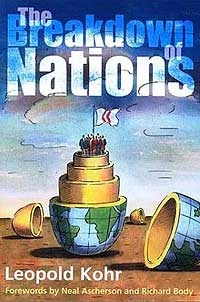Devolution in the United Kingdom
This post is of a review I wrote for the 25th issue of BlueGreenEarth, in 2002 (it is now archived in the Reviews section of the .us archive) . As Bliar's government is approaching election time again, I think it appropriate to revisit a book about one aspect of constitutional reform for the UK. The EU is also overdue for a re-democratising phase, de-fanging the Council of Ministers; re-launching the Council of the Regions as an elected second chamber; erecting trade bariers to extra-European goods, etc. But, whatever happens, the UK's current 'democracy' is at best partial, and again the time approaches to say 'enough', and militantly fight for change...
Tim
Devolution in the United Kingdom
by Vernon Bogdanor
 In 1979 Vernon Bogdanor published his highly influential Devolution
In 1979 Vernon Bogdanor published his highly influential DevolutionBogdanor begins his book with a brief history of the 'United' Kingdom, reminding the reader of the circumstances behind each of the main countries addition to the 'union'. He notes early on the fact that England's dominance in the union meant that to be Scots or Welsh in any cultural sense was to be intrinsically opposed to Englishness, a regionalist tendency that was difficult to avoid and that makes a stable union difficult to acheive. Irishness was more problematic still, as the circumstances of union for that island were a good deal less amenable than was the case for Wales and Scotland. Even within England, the London & the South-East bias has caused friction. With this in mind, and with the fact that the UK has little by way of cohesive and intentional written constitution to give a legalistic gloss to union, it is little surprise that the concepts of devolution, and, occasionally, downright seperatism, have reared their heads. The supremacy of Parliament may be regarded as a threat to peace in a broad union of unequal partners, rather than some fabulous alchemical glue that holds together diverse cultures in blissful combine.
The loose Tudor hold over Wales was acceptable, as the Tudor dynasty, though based in London, were of Welsh origin. For Wales the issue of devolution has been largely based upon an unwillingness to give up their native culture, rather than on political problems. This may help explain the the Welsh acceptance of an Assembly that allows some executive devolution, rather than legislative devolution. Bogdanor describes the consequence of this as being a 'form of regionalism'. The Scots differed, in that the driving force would appear to be a desire for institutional autonomy. The succession of James VI of Scotland to the English throne, as James I, took the Scots to England rather than vice versa, despite the obvious economic strength of the latter. To retain identity the Scots required distinct institutional mechanisms, and indeed it has retained more of these than might be expected, in the form or its own legal system and church. The Treaty of Union,"freely negotiated on a footing of equality", abolished its seperate parliament, yet the (re-)introduction of a Scottish parliament in the late twentieth-century seems somehow of a piece with the history of the union. However, it is understandably perceived by some as opening the gates above a slippery slope, leading from devolution, somewhere near the top, to outright breakdown of the union at the bottom. Equally understandably, some of those that see this possibility applause it. Nevertheless the actual nature of Scottish devolution is far less revolutionary than this. Bogdanor characterises the Scottish form of devolution as a 'form of quasi-federalism'.
Scottish "Devolution revises the terms of the Treaty of Union. But it does not signify a return to the pre- 1707 condition in which Scotland possessed a parliament co-ordinate with that of England. That policy, the policy of re-establishing the Union of the Crowns, is favoured by the Scottish National Party, but it is far from the purpose of the Labour government which has legislated for devolution. Devolution instead provides for a parliament which is constitutionly subordinate to Westminster. Devolution seeks to revise the Union, not to destroy it."
This dispenses with the parts the English expansion that were the result of Treaty and negotiation. The Irish case, however, has much more the form of expansion by conquest, at least in its early phases. Ireland has long had a measure of cultural unity, but the attempt to deliver a stable political unity, under but one High King, has proven less easy. The Viking defeat was followed by some 160 years of relative unity, but it has since been under the aegis of English rule that this has sporadically been acheived. It must be noted, though, that the mechanism of failure in 1169 was invasion by Henry II. Henry VIII's 'acceptance' as High King in 1541, and the later constitutional subordination of 1603, saw the chances of an indigenous Irish political unity crushed. The plantations followed, sowing Scots protestant oats among Irish communities of the north-east and English in the south and east. This created knots of foreign culture that would from thenceforth prove insurmountable barriers to Irish unity. The 'resolution' of this issue, the creation of an Irish Free State and of an 'English' rump state in the six counties, is temporary at best. The devolved option, like the Home Rule option before it, is readily interpreted as a step too far down that slippery slope to outright seccession (though until Bloody Sunday Northern Ireland had enjoyed just that for fifty years). Although the majority in the six counties do not favour this option, the demographic movements of the last two decades make it hard to see how the separatists can remain a minority. Unionist support for the current attempts at a settlement would, therefore, appear to be their last chance to influence a future constitutional 'catastrophe'. It is hard to see, then, why they won't make more effort while they can. Trimble's Popperian attitude may be seen as a merely pragmatic effort to reconcile irreconcilables before his party have to concede all.
Matters are complicated in Ireland by a number of other factors. We shall mention only a few, and not necessarily the most important. However, in England at least, these points are rarely mentioned. One, the Republic as a whole has little obvious wish to inherit the North and all the social costs that it would bring. Two, the contingent for Irish union in the north are dominated by Sinn Fein, whose 'Ourselves Alone' stance would be relatively unproblematic were it not accompanied by a 'communist' political philosophy that does not sit well with the opportunist free marketeering of Dublin. Third, an independent Ireland once seemed to depend upon the inclusion of the economic powerhouse of Belfast. That wealth has been curbed viciously since the seventies, against the backdrop of industrial decline on the mainland since OPEC, the short-sighted intransigence of Trades Unions in response to OPEC, and the ill-conceived Thatcherite free trade agenda. (The other factor, the Republic's economic revival over the last few years, appears to orient Dublin with both Europe and the de-regulating global capitalist community, leaving one to wonder how it is that so many resident there have made plain their antipathy to their benefactor, the European Union). These factors, leading to apathy on the part of many in the Republic over the question of union with the six counties, complimented by the extreme antipathy to any sort of solution on the part of the unionists in the six counties, and complicated by the existence of a small but passionate and 'righteously' violently inclined body of men who fervently seek union, create contradictions that everyone is aware of.
The 'obvious' 'solution' of simply allowing a unified Ireland (after all, the Dublin government seems the epitome of conservatism, with a free market attitude that Westminster, whether under Tory or 'Labour' rule, should applaud), is therefore queered before begun, not least, and ironically, by the refusal on the part of the IRA to allow the peaceful conditions that are required to manifest themselves along the border. Though, where the IRA are concerned, it is obvious that unionist reprisals are not a remote concern, and that a peace brokered by Westminster between unionists and republicans is as trustworthy as one brokered by the US between Israel and the PLO - ie, not at all (what would you do if 'peace' was to be brokered by the armourers of your foe?).
Thus it is that the solution is there for all to see, but for no-one to reach to pick up. If Home Rule had been acheived under Gladstone, Bogdanor supposes, then, even if it did not result in closer union by defusing some of the complaints of the separatists, it may have made a transition to a Free State less fraught. And it would appear that this must be an eventual goal of all concerned (bar the unionist soon-to-be minority in the six counties). A successfully devolved UK could surely only contain amenable parties. The devolution of power within mainland Britain could be beneficial to continued union, where the inclusion of the Irish provinces could not. A regionally representative version of a devolved UK has little support at present, even in Kernow. Some, though, have supposed that this may prove more amenable to those in the six counties. Bogdanor's view of this 'solution' is negative: "...Irish nationalists did not regard Ireland as a region, and a regional form of government would not, they beleived, satisfy the national aspirations of the Irish people; and the English were not prepared to restore the heptarchy soley to help resolve the Irish problem." Northern Ireland as a devolved region, or a federal state, or as a directly ruled part of Britain appears to be a no-no. However, if one ignores the current unfashionablity of regional solutions to local autonomy in the rest of the UK, could constitutional reform help us rule mainland Britain better?
There are many possibilities for constitutional reform, as many suggestions as advocates perhaps. But the nature of our 'constitution' is increasingly obviously not democratic. The state simply does not represent the views of its people. Ignoring the 'ignoramus' argument (that all the great British public would do, if directly represented, is bring back hanging), it seems that one obvious minimum reform in the re-democratisation of our nation (a nation that has in fact never been very democratic in the first place) would be proportional representation.
Proportional representation would require the abolition of the patently unfair first-past-the-post system of counting votes cast. In the 1980's the Liberal Democrats achieved a stunning third of all votes in the country. Yet they were awarded only 11 seats in Parliament. With proportionality they would have had around 200 seats. That we have "one man, one vote" is a patent fib. If I live in a seat with a large Labour majority, but support some other party, then, if there are 50,000 voters, my vote is not representative of one 50,000th of the result, but precisely zero. Equally, if I support Labour in that seat, my vote is worth 50,000 votes. This is an insupportable situation in any "real" democracy! Proportional Representation, wherein my 50,000th share in the result would be just that (I would be "one man" with "one vote"), has been a key feature in the new devolved parliaments for Scotland, Wales, and Northern Ireland.
The Irish counties had experienced proportional representation before, and in the twenties saw a move, in the counties of Fermanagh and Tyrone, to join the Irish Free State. To block this democratically expressed wish on the part of a majority in those counties, Sir James Craig (Northern Ireland's Prime Minister at the time) engineered a return to first-past-the-post. "The consequence was that despite Catholic majorities in Fermanagh, Tyrone, and Londonderry city, their local councils came to enjoy unionist majorities." (p.76). The Cameron report in 1969 would appear to implicate this change in explaining the Troubles. It is widely speculated that the success of devolved political power may depend, to some degree, on having a proportional system of representation. Certainly, this seems to have been in mind when designing the more recent devolved parliaments in the UK. In 1996 the Northern Ireland Forum adopted a list-system for it's new proportionally representative elections.
The Scottish general election results, in 1996, broke down thus: Labour received 46% of the vote, the Tories 18%, Lib Dems 13% and the Scottish Nationalist Party 22% ("others" got the remainder). Under a PR system the seats would be allocated so - Labour, 33 seats; Tory, 13; Lib Dem, 10; and SNP, 16. But the allocation, based as it was upon a first-past-the-post system, gave Labour, 56 seats; the Tories, zero seats; the Lib Dems, 10 seats; and the SNP 16. This is patently unfair, and party politics really should not come into a recognition of the fact. The May 1999 elections for the Scottish Parliament (and for the Welsh National Assembly) "were the first to be held on the mainland by any proportional representation system since the abolition of the university seats in 1950." (p.219).
This silver lining, however, is coloured by the fact that the form of PR adopted is based on the additional- member system. Most pundits prefer the single-transferable vote as a method of mediating the approximate proportionality that is offered (few advocate absolute proportionality). Nevertheless, PR has real advantages even in the form that has been adopted. The question remains, of course, when shall PR be adopted for Westminster?
Frankly, not soon. There is still much cynicism and confusion over the issue in England. This is, as usual, a cynicism and confusion heavily promoted by the media. When a member of the public argues against PR, it is fair to assume that he is either, a) ignorant, or b) disingenuous. The former is more likely given the UK press, especially the tabloid press. However, when a presumably informed politician, of whatever party, argues agianst it, it is fair to assume that he is being disingenuous. The politician will reel out the example of, say, Weimar Germany, pointing out the role of PR in the rise of Hitler, and will say that "therefore" PR leads to weak government. He will know that no-one suggesting PR considers the pre-war German version acceptable, and that they will NOT be suggesting it. He will know that PR has performed a real service in post-war Germany, aiding the country's recovery and forming strong alliances between parties. These alliances have not involved tiny loony factions, as a (I think) 5% cut-off is applied, whereby parties that get less than this percentage of the vote get no representation at all. These alliances, far from making it impossible to make decisions, have enabled decision-making to avoid the extreme ideological and economic swings and roundabouts that first-past-the-post has enshrined in British politics.
Imagine Britain in the 1980's without Thatcher's overall majority, in which no one party, once the electorate have turned out and put their cross against her party's name and buggered off again for a few years, can ride rough-shod over all and sundry, including the mandate in their election propaganda. Imagine, in other words, a rational and balanced approach to legislation!
For the forseeable future, at least, imagine is all that we can do. Thus, even the limited reform that PR would be appears a bit utopian at present. Other reforms, then, are even more 'out there'. However, just because certain ideas are unfashionable does not mean that they should not be discussed. Indeed, the very fact of devolution in any form, to parliaments with any form of PR, is itself a hopeful sign (oh dear, I hear some say, we have opened the flood-gates). With Bogdanor's book on devolution on hand, let us look at this and other ways of deconstructing the monolithic and undemocratic nation-state.
"The setting-up of the Scottish Parliament and the Welsh Assembly... seem to imply that the United Kingdom is becoming a union of nations, each with its own identity and institutions, rather than as the English have often seen it,...'one nation representing different kinds of people' [a formulation which recognises other diversities than merely those of regional difference] Constitutionally, devolution is a mere delegation of power from a superior political body to an inferior. Politically, however, devolution places a powerful weapon in the hands of the Scots and the Welsh; and, just as one cannot be sure that a weapon will always be used only for the specified purposes for which it may have been intended, so also one cannot predict the use which the Scots and the Welsh will make of devolution."
The supremacy of Parliament in Westminster is potentially undermined by the mere existence of an, albeit nominally weaker, parliament in Scotland. This is at the same time as the effective abrogation of British sovereignty to the European Union. Europe may well be both centrifugally uniting in Brussels, and at the same time undergoing a centripetal action as regional powers develop. The Council of the Regions always appeared to me to be one of the most potentially interesting and revolutionary elements of the European constitution. It also appears to be one of the most under-mentioned, no doubt for exactly those reasons. Under-developed, I foresee that it shall gain importance by default. I do not see devolution in the UK as happening in a vacuum, nor do I see Scotland and Wales as being the only British regions that will eventually seek autonomy. The current Irish attitude to Europe notwithstanding, they too may gain from these developments. At the same time, of course, there is a counter-movement towards internationalization inherent in the Maastricht and Nice Treaties - I foresee a radical clash in the near future that will suck all of Europe into regionalist reformism that will require the lionization of the Council of the Regions to peacefully mediate a transformation of Europe (some regions may be separatist with regard to their parent state, others more interested in the dispersal of power - hopefully toward confederalism). Its success will, in part, depend on overcoming the pressures from free market international traders.

The question, then, is not what use will the Scots and Welsh make of devolution, but what demand for it, or for some similar reform, will be made by, say, Cornwall, Wessex, or Yorkshire. This is where the work of Leopold Kohr comes in. The Breakdown of Nations, rooted in opinions Kohr first expressed in 1941 (Disunion Now, The Commonweal magazine), met an underwhelming response at the time of it's first publication. It has since come to be regarded as a classic, especially in anarchist circles. This writer first came across it in it's 1986 edition, published by RKP, and with an introduction penned by Ivan Illich. Kohr saw sheer size as a prime cause of social misery - the larger the state the less possible for it to address social inequality properly (indeed, it would create it). He saw a breakup of the union as a solution. Since devolved power sees supremacy, theoretically at least, still reside in a large central power (Westminster / Whitehall), the Breakdown of Nations required could be more accurately described as federalism, to the extent that some communion between regions would be necessary (ie, not mediaeval / feudal mini-states, but a patchwork of mutually co-operative self-governing provinces). Kohr was, however, not utopianist enough to believe that such a sensible and socially beneficial move away from nation-states would occur. Chapter 11 is entitled "But will it Be Done?", and has a text consisting of one word - "NO!". If he were still alive, I doubt that he would be much less pessimistic, and indeed, in the face of the forces of globalization, he may be more pessimistic - however, I do not doubt that he would be fascinated by the new shapes that Britain and Europe are pulling and pushing themselves into.
The size of the regions that Kohr described were defined in several ways, but the most striking, which he illustrated by means of a map, is a geometrical division of Europe, as per the United States, with boundaries modified along "traditional tribal frontiers". This divides France into eight or nine regions (including Isle de France, Aquitaine and Burgundy), Germany into a similar number of regions (including Hanover, Saxony and Bavaria), etc... One drawback is that Kohr lacks vision when dividing the UK, as it consists, in his loose plan, of England, Scotland and Wales, with Ireland divided, the six counties still separate. He sees no room even for Kernow in this view. However, the basic scheme appears sensible, and of a piece with the 'Small is Beautiful' philosophies of Ivan Illich, E.F.Schumacher and many other broadly 'anarchist' thinkers.
The problem of self-sufficiency is not addressed by these divisions. Indeed, even current models of devolution beg questions such as 'Can Scotland maintain a devolved authority on the back of North Sea oil and Golf?'. A federal / confederal Europe can, of course, operate co-operatively enough to transcend these barriers, but experience suggests that it is unlikely to occur. The Social Charter, which was one of the few plainly positive elements of proposed European Union, has been among the most vilified, just as with the Council of the Regions. But the mechanisms can be imagined. It is our job, and that of future generations, to enact these ideas for the good of all. The question of what regions are possible, if self-sufficiency is required, is not entirely idle, however. With the growth of interest in Green issues, sustainable economy has come to be seen as important to any future that we may have. If regions could be defined in ways that, while recognising some cultural attractors, also recognised some aspects of resource need and self-sufficiency, it may lead to more stable units, and thereby, with proper co-operation, greater peace.
"Sustainability" is a phrase in economics that had a 'radical' usage only recently. It was co-opted quicker than you can say 'corporate capitalist', being moved from an anti-capitalist position in the lexicon to, first, a 'green capitalist' position (an oxymoron if ever there was one), and, more recently, to a solidly mid-stream corporate buzz-word (where it entails the dubious belief that sustainable means 'can keep growing, just as before', really). As such it has no meaning. In this article I shall be briefly re-investing it with its obvious literal meaning. We live on a rock in space. It has finite size, and finite resources. While the size of the sphere is quite big from our ant-like perspective, the important resources are spread thinly and unequally over a thin layer of the landmass. Many of our mineral resources are close to running out altogether (oil is the least of these, with a good deal of high grade, and huge amounts of low grade, oil known of but untapped). The bio-resources are in a different state agian. Here many of our resources have been entirely used up (this is known as extinction). Agriculturally, we are hell-bent on intensive, wide-area farming methods that reduce the diversity, and thereby reduce the viability, of the biosphere. These problems have particular resonance for Europe.
As an old, and resource hungry part of man's domain, Europe has used up many of its indigenous resources. Many species are extinct, and many more close to extinction. Many of the raw materials we once took from the ground beneath our feet are now imported from foreign shores. We have created and distributed globally many pollutants that cannot be removed by us, and which take forever to be dealt with adequately by 'Nature'. Our soils have been farmed so intensively that we cannot grow sufficient foodstuffs to feed our greedy populace without recourse to huge amounts of artificial fertilizers that further reduce soil quality. This model of global agriculture is very energy- intensive, so that rising fossil fuel costs also effect the region's ability to meet it's needs...
Thus it is that many aspects of 'self-sufficiency' seem to be well out of the control of Europe's regions, nations, and indeed Europe itself. Some may be out of the control of the whole globe, though it would be nice to see us co-operate long enough to find out if this is so (before it is definately so, which it may be already). Certainly Britain, which has two-thirds of its net food needs provided by imports, is not by this definition capable of self-sufficiency. However, for much of its history the British Isles have been quite capable of complete self-sufficiency. Most periods of hardship were due to political systems that created shortage where there was none (just as the World Bank, or the IMF, say, does today when they loan huge sums of money to tin-pot third world dictators and then demand even huger repayments from populations that are starving and hardly responsible for the - often CIA-enthroned - dictators that they live under. If they overthrow the dictator, who will have spent the cash on luxuries for his pals and military hardware to keep his position by bombing the crap out of his own people, then they are still held to the debt). Those periods of hardship that were due to genuine shortage ( the results of crop failure, say) would be less problematic under a system of global resource management and with the modern technologies that could be used to create the world's first post-scarcity environment (in the sense that human governance, as well as technical primitivism, has been at the heart of scarcity in the past). If, tomorrow, the UK found itself in a global depression, with, frankly, little to trade if our service economy is slowed, then we simply could not feed ourselves.
It is here that alliances with our neighbours (ie: European Union) would save us. The idea of self-sufficient regions is, therefore, an obvious nonsense on this level in much of the developed world. However, the key word here is 'relative', as some degree of self-sufficiency is still possible, and, evidently, could be useful even where neighbourliness thrives. The term that Social Ecologist's use for the kind of self-sufficient units that I have in mind is 'Bioregion'. The bioregionalist movement has not gained much ground in Britain, our island status, perhaps, discouraging the idea being taken seriously. Indeed, with our reliance upon ghost acres, it is hard to see how, food-wise, we could have a large enough number of bioregions here to make traditional boundaries unattractive. Yet we already have a number of these natural regions, because the definition of self-sufficiency that would apply to them is actually fairly modest, as the requirement is not for survivalists to approve of the boundaries, but realists with the ability to compromise and negotiate with their neighbours.
In Britain, a move towards more sustainable agriculture is long overdue. It takes time to put in place, and so needs to be undertaken on a large-scale immediately. It would require a move to utilise brown-field sites in cities as allotments, perhaps even ripping up some roads and realloting them as allotments; it would require all empty buildings to be utilised for social housing; and it would entail a movement out of the built-up urban areas to garden cities in some controlled fashion that does not require destroying yet more countryside; and certainly it may require the inhabitants to enhance the chances of co-operation by clustering into loose affinity groups where necessary (and I know that there are many contradictions with all these ideas). The 'viable' areas that may ultimately emerge might centre on, say, a watertable, or some other system of natural life-support system. It is this that makes such ideas workable in larger areas, such as continental North America, and difficult in the UK. Nevertheless, parts of Britain with relatively low population, such as those already seeking devolution (Scotland and Wales), and others such as Cornwall, the Marches, Cumbria and north & central Yorkshire, could achieve relative bioregional autonomy. And everywhere would benefit from more of an attempt to live-in-place.
Living-in-place would require the development of an awareness of ecological relationships that operate between us and the environment, and between different elements of our bioregional environment. We must regain an awareness of our embeddedness in the natural world, and stop trying to force our way out of this relationship. It is our attempts to 'transcend' nature by controlling it in the negative sense that have caused the crises we face in the world. We need to use our technical nature to become stewards of the planet rather than its rapists.
It is difficult, if not impossible to disagree with Kohr's pessimistic expectation of these developments, in part because to live in harmony with our environment is anti-pathetical to our most popular form of economic activity - capitalism. It hurts the profit-oriented economy to have to account for short- and long-term natural cycles when we have the mentality that says, 'well, lets get the resources from over there in the meantime', 'over there' being a third world country whose equally misguided means of meeting their needs is answered in the short-term by saying 'yes, here, take it', when what they sell now they need tomorrow.
Even given the utopian quality of many of the constitutional reformations that the UK could undergo, some of which might only be possible after devolution has become entrenched and meaningful, a move towards a federal state, at least, may be well under way. In Bogdanor's view federalism has some advantages: "The creation of subordinate legislatures in England, Scotland, and Wales would resolve the problem of representation, since Westminster would become a federal parliament, and the Irish [and others] would be represented in it on precisely the same terms as the other nationalities in the United Kingdom. [...]Federalism might also help to secure a more equitable division of revenues between the various parts of the state, since each of the legislatures would enjoy the same taxing powers. Above all, however, federalism could preserve the unity of the kingdom and ward off separatism, since it would give to Ireland [& others] nothing which was not also given to other parts of the United Kingdom." Having a centre for a federal Europe in Brussels (or, perhaps, Geneva) is another interesting corollary of all that has been said. However, the federal solution still maintains central government of many aspects of the subsidiary units. Confederation, by contrast, gives the units within the group their individual sovereignty as well. According to the social ecologists, Janet Biehl and Murray Bookchin:
"The broad principle of political and social organisation that can institutionalize interdependence without resorting to a State and at the same time preserve the power of municipal assemblies is confederalism. A confederation is a network in which several political entities combine to form a larger whole. Although a larger entity is formed in the process of confederating, the smaller entities... retain their freedom and identity and their sovereignty even as they confederate. In an ecological society, the municipalities that have undergone democratization - that is, whose charters have been changed so that citizens' assemblies hold the supreme political power within the municipality - would form confederations on a regional basis to address transmunicipal or regional concerns. These confederations would institutionalize the inherent interdependence of communities, without depriving them of their freedom and sovereignty.
"Instead of a central government, with a legislature voting to approve or reject laws, a confederation is typically embodied in a congress of delegates that co-ordinates policies and practices of the member communities. In a libertarian municipalist polity, the municipalities would form such confederations by sending delegates to them. These delegates would not be representatives; that is, their purpose would not be to make policies or laws on behalf of their supposedly benighted constituents, in ways that they imagine to be beneficial to them. Instead, the delegates would be mandated by the people in their municipal assemblies to carry out their wishes.
"The delegates' functions would be to convey the wishes of the municipality to the confederal level. In conjunction with the other delegates in the confederation, they would co-ordinate policies to meet common ends that the several member communities have agreed upon and adjudicate any differences that may arise among themselves. All delegates would be accountable to the assemblies that have mandated them as their agents... Entirely responsible to the citizens' assemblies, the delegates would be recallable in the event that they violated a mandate. Rather than making policy decisions in its own right, the confederal council would exist primarily for administrative purposes - that is, for the purpose of co-ordinating and executing policies formulated by the assemblies."
It is plain to see that this is not how things work in the UK. It is also plain that that is not how the currently conceived devolved version of UK governance would work. It is also transparently obvious that, the realisticness of achieving confederalism here aside, there is no way that any other kind of governance than that of directly democratic municipal assemblies, who co-ordinate with other municipalities and regions through a confederal parliament, can be described as truly democratic at all. And this is the form of governance that offers the best hope for the many different folks of this island to live peacefully and well by their different strokes.












